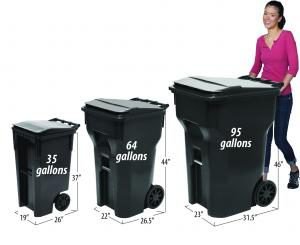By JANE MCCLURE
The costs of organized trash collection, which starts Oct. 1 in St. Paul, continue to meet pushback from some homeowners, as well as owners of small multi-family properties. Those who espouse recycling and composting more, and throwing away less, are making their feelings known in a variety of ways—including a civil lawsuit.
Highland resident and former city financial analyst Peter Butler filed the lawsuit in Ramsey County District Court May 21. He contends that the proposed organized collection system and its fee schedule violate Minnesota’s Waste Management Act.
City officials aren’t commenting on the lawsuit. They have 20 days in which to reply in court. That must happen by June 11 (as the Monitor went to press). But with a signed contract with a garbage hauling consortium in place, it’s not clear how much, if anything, can be changed by the lawsuit or by other citizen action.
Proponents of organized collection say it will create consistency in trash disposal prices, reduce neighborhood traffic and wear and tear on streets and alleys, and force those who haven’t had trash service in the past to pay for disposal. They cite illegal dumping of trash as a constant problem.
But opponents argue that having the city choose a neighborhood hauler, or haulers, takes away their freedom of choice and ability to negotiate for service.
“Zero waste” advocates point out that the city contract with residential haulers doesn’t provide incentives to reduce waste through recycling, composting, and changes in consumption. The five-year contract eliminates the possibility of single-family homeowners and residents of small rental buildings from sharing a trash cart.
It’s not clear how many residential properties don’t have garbage service now. While there are those who refuse to pay for service, others share carts or take their trash to garbage transfer stations.
Butler shares trash service with neighbors and doesn’t contract for his pickup service because he doesn’t need it. “I just don’t generate that much waste,” he said. “Now even with every-other-week service I’ll pay for service I’ll barely use.”
 The waste management act, which was originally adopted by state lawmakers in 1980, outlines waste management practices to protect the state’s land, air, water and public health. The act requires municipal solid waste collection systems to charge for disposal based on volume or weight of waste collected. Butler said the city’s planned charges provide no incentive for people like himself who generate very little solid waste. Those who generate the most waste get the best discounts under the fees planned.
The waste management act, which was originally adopted by state lawmakers in 1980, outlines waste management practices to protect the state’s land, air, water and public health. The act requires municipal solid waste collection systems to charge for disposal based on volume or weight of waste collected. Butler said the city’s planned charges provide no incentive for people like himself who generate very little solid waste. Those who generate the most waste get the best discounts under the fees planned.
Waste reduction, recycling, and reuse are among the state act’s top goals. Landfilling or “land disposal” of waste is considered to be the least-preferred option, which Butler points out in court documents.
The city is offering four monthly levels of service. Homeowners and landlords of small rental properties had until June 1 to choose their level of service. There is no option of sharing a cart as most rental properties, and some single-family homeowners have been doing.
The smallest and least frequent service, a 35-gallon cart collected every other week cost $20.28 per month. That breaks down to $9.36 per collection or 27 cents per gallon.
The largest cart with weekly service is a 95-gallon cart, collected weekly, at $34.15. That cart user will pay $7.88 per collection or eight centers per gallon.
Butler said that the state law requires a base rate, which would result in a higher rate for those who generate more trash. Instead, he points out in the lawsuit that St. Paul’s pricing system decreases the cost per gallon of waste collection as the volume increases.
Others continue to object to the contract. A small group of residents met with Mayor Melvin Carter May 31. Frogtown resident Kristin Becker collected copies of residents’ cart selection postcards, where they had indicated the size cart they were ordering and the size of cart or service they actually need.
Like Butler, Becker said her household strives to generate as little waste as possible. She’ll be paying much more for trash service as will many of her neighbors.
Becker said she practices zero waste and needs minimal trash service. “We needed to bring a loud voice to the mayor’s office about this change,” she said.
Comments
No comments on this item Please log in to comment by clicking here